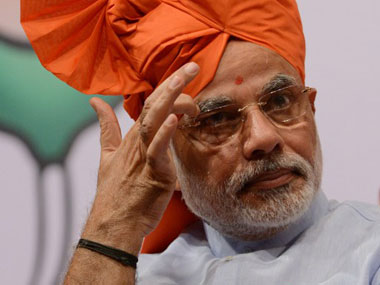Goldman Sachs is again at it. The global financial services company, also infamous for a few missed predictions, has poured more oil into the ragingdebate on Gujarat model in India.
A new report from the brokerage house has done a comparative study between Gujarat and West Bengal’s labour policies, favouring the former. According to the report, the state, where BJP’s prime ministerial candidate Narendra Modi has been chief minister for three times, has managed a 60 percent growth in manufacturing between 2000 and 2012 thanks to its pro-employer policies. West Bengal, meanwhile, has seen only a 22 percent growth due to its pro-labour policies.
[caption id=“attachment_80633” align=“alignleft” width=“380”]
 A new report from the brokerage house has done a comparative study between Gujarat and West Bengal’s labour policies, favouring the former.[/caption]
A new report from the brokerage house has done a comparative study between Gujarat and West Bengal’s labour policies, favouring the former.[/caption]
The report, titled ‘110 million jobs’, argues that states which implementedpro-worker amendmentsto the Industrial Disputes Act saw a decline in output, employment, andproductivity, while those which introduced pro-employer amendments saw an increase inemployment and output.
On that metric, Gujarat is considered a pro-employer state, while West Bengal is a pro-worker state.
The report notes that the Gujarat government amended the Industrial Disputes Act in 2004 to allow for greater flexibility in the labour market for Special Economic Zones (SEZ).
As part of its policy, it allowed companies within the SEZ to lay off workers, without seeking the permission of the government, by simply giving a one-month notice to the worker.
Laws were also amended so that if a firm wanted to exit the SEZ, it could shut shop by giving a tw0-month notice to the state government, pointed out Goldman Sachs.
In contrast, the normal legal requirement implies seeking permission from the government, with the latter giving an opportunity for the employees tobe heard on the issue, which, as a result, leads to a long-drawn litigation process.There are several stories of such disputes carrying on for years until workers reach their retirement age too.
Now, take the case of the West Bengal government, which made several pro-worker changes that make it virtually impossible to shut down a loss-making factory.
“The employer with the application for closure must ‘contain the particulars of the quantum, mode, manner and time of payment of compensation to the workmen’. The owner is also required to furnish a guarantee to discharge liability for payment of compensation to the workmen. Most factory owners thus prefer to keep their loss-making units barely alive, but strip its assets. This prevents the churn of capital and labour, which is at the heart ofmodern enterprise,” says the Goldman report.
Such stringent labour laws are not onlyaffecting the demand for labour but also leading to a smaller scale of operations. In turn, labour is resorting to informal employment.
“Complex labor laws incentivise firms to remain small and in the informal sector. Thisallows them to remain under the radar of labor officials and escape stringent provisions,” argues Goldman.
Little wonder that the informal workforce is highest in India.
[caption id=“attachment_80603” align=“aligncenter” width=“600”]
 Source: Goldman Sachs Research[/caption]
Source: Goldman Sachs Research[/caption]
Economist Arvind Panagariya , who has been at the centre of the debate over viability of the Gujarat model, has earlier argued that India’s over-protective labour laws is what is preventing India from attaining inclusive growth.
“We need to restore some balance in the laws, such that there is an incentive for entrepreneurs to set up their businesses in labour-intensive sectors and hire workers,” he says.
)